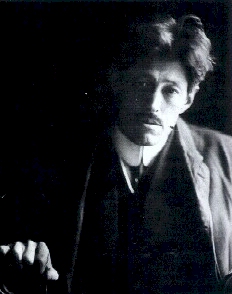SADAKICHI HARTMANN
While doing a search project about Whitman’s racism during his Camden years, I came across an interesting story about a Whitman disciple named Sadakichi Hartmann. Surprisingly, Reynolds does not mention Hartmann in his book.
Whitman’s admiration for Asian civilizations is apparent in his work. In “Passage to India,” he suggests that the complete of the transcontinental railroad as the completion of Columbus’ voyage, and America as a connection between the great civilizations of Europe and Asia. Whitman had a circular view of civilization–Asia as the beginning of civilization, Europe as the absolute end. In “Passage to India,” he even advocates interracial marriage.
Passage to India!
Lo, soul, seest though not God’s purpose from the first?
The earth to be spann’d, connected by network,
The races, neighbors, to marry and be given in marriage,
The oceans to be cross’d, the distant brought near,
the lands to be welded together (Whitman, 532)
Whitman was horrified by the Chinese Exclusion Act passed by Congress in 1882. Whitman threatened to denounce his citizenship in protest saying, “In that narrowest sense, I am not an American—count me out” (Li, 181). He made his view on immigration clear telling Traubel,
“Restrict nothing—keep everything open: to Italy, to China, to anybody. I love America, I believe in America, because her belly can hold and digest all—anarchist, socialist, peacemakers, fighters, disturbers or degenerates of whatever sort—hold and digest all. If I felt that America could not do this I would be indifferent as between our institutions and any others. America is not all in all—the sum total: she is only to contribute her contribution to the big scheme” (Traubel 1:113).
Whitman’s contact with Asian immigrants was rather limited since Camden had only two Chinese-Americans in 1880 and fifty-four in 1890. By 1895, the city directory listed 29 Chinese-run laundries. As their numbers grew, so did anti-Chinese hatred. In the late 1890s, white locals stoned, burned, and dynamited Chinese laundries. Chinese were frequently harassed, beaten, and on a few occasions, murdered (Dorwart, 91).
Whitman’s only known contact with an Asian American in Camden was with Sadakichi Hartmann. He was born in Japan in 1867 to a German father and Japanese mother and raised mostly in Germany. When his father disinherited him for refusing to attend military school, Hartmann immigrated to California. There, he was harassed on suspicion of being a Japanese agent. He moved to Philadelphia to live with an uncle and studied briefly at the Spring Garden Institute. A “dusty bookseller” encouraged Hartmann to visit the poet in Camden telling him, “He is living across the river in Camden and likes to see all sorts of people.” Hartmann visited the poet frequently and became a Whitman disciple, founding a Whitman club. Their relationship soured when Whitman told Hartmann, “There are so many traits, characteristics, Americanisms which you would never get at . . . After all, one can’t grow roses on a peach tree” (Hartmann, 8). Whitman was furious when Hartmann published some of Whitman’s catty remarks about contemporary writers in the New York Herald (Li, 184). The annoyed Whitman questioned Hartmann integrity to Traubel.
“In is in him something basic—something that relates to origins . . . He is a biggish young fellow – has a Tartic face. He is the offspring of a match between a German—the father—and Japanese woman: has the Tartic makeup. And the Asian craftiness, too—all of it!” (Traubel 5:38).
Just before Whitman’s death, Hartmann and his wife visited Whitman and the two made amends. When he learned of Whitman’s death, Hartmann was in New York and unable to afford the train fare to attend Whitman’s funeral. He went to Central Park and “held a silent communion with the soul atoms of the Good Grey Poet, of which a few seem to have wafted to me on the mild March winds” (Hartmann, 50).
Like many of Whitman’s disciples, he wrote a short book detailing his interactions with Whitman. In 1894, he wrote Conversations with Walt Whitman. Hartmann wrote became an early proponent of literary Modernism in the twentieth century. He wrote several volumes of poetry in the early and was one of the first to write English language haikus. He died in 1944.
Works Cited
Dorwart, Jeffrey M. Camden County: the making of a metropolitan community, 1626-2000. New Brunswick, N.J.: Rutgers University Press, 2001.
Hartmann, Sadakichi. Conversations with Walt Whitman. New York: Gordon Press, 1972.
Li, Xilao. “Walt Whitman and Asian American Writers.” Walt Whitman Quarterly Review 10.4 (1993): 179-194. Print.

